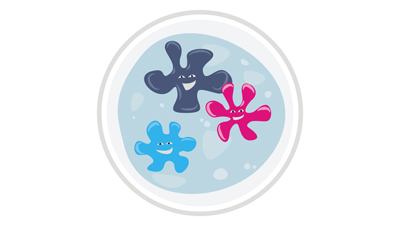
Is there such a thing as healthy bacteria? The simple answer is of course there is!
These bacteria normally line your digestive tract and are especially active in the lower aspects of the small intestine and the entire length of the colon. It is estimated that there are approximately several pounds of these nice bacteria in your digestive tracts. Over 40 different species have been identified.
So what kind of bacteria is bad for you? Bacteria like e-coli, proteus, enterococcus, and klebsiella can cause serious harm if their numbers are not controlled. This is one of the ways in which normal bacteria can help by controlling the overgrowth of harmful bacteria that can live in your gut.
The Benefits of Healthy Bacteria
Most of the normal bacterial flora that forms colonies within our gut is derived from foods which have undergone the fermentation process. That’s why these types of bacteria like lactobacillis acidophilus, and bifidobacterium bifidus can be found in foods like yogurt and kefir or in a supplement form. Normal bacteria have many important functions within the human body.
They can help ferment soluble fiber, enhance the absorption of nutrients, regulate the immune response, decrease inflammation, improve gut motility, produce important hormones, and nutrients like vitamin K.
Yogurt is probably one of the best sources of good bacteria. Not only is yogurt a great source of calcium, vitamin D, and protein but it is usually also full of bacterial culture used in the manufacturing process. The flora contained within yogurt can help alleviate the symptoms associated with lactose intolerance because the bacteria can use lactose as a fuel source. The normal bacterium contained within yogurt is also a very good remedy for irritable bowel syndrome.
Fermented food like unpasteurized sauerkraut have high concentrations of probiotic bacteria like acidophilus. Fermented soybean paste also known as miso is a part of Japanese cuisine but also contains high concentrations of beneficial bacteria.
A drink that has the highest amounts of beneficial bacteria is kefir. This drink is actually made by adding a mixture of bacteria and yeast to various types of milk which undergoes a fermentation process. Kefir has a thick and rich but tangy taste and makes an excellent smoothie.
Meat substitutes like tempeh made with fermented soybeans is also an excellent vegetarian source of bacteria and it is also a great source of protein.
If you don’t eat foods high in probiotic bacteria, I would suggest taking a probiotic supplement. These supplements are available in a capsule or liquid form and can give you the healthy bacteria you need. If you wish to take a probiotic supplement, purchase one that has a full-spectrum array of bacteria.
If you’re regularly taking certain drugs like antacids, antibiotics, and antifungal drugs, you may want to take a probiotic supplement as well or if you are intending to travel abroad, it may be wise to begin taking a pro-biotic supplement several days before you leave.
Source:
“The truth about probiotics and your gut,” WebMD web site; http://www.webmd.com/digestive-disorders/probiotics-10/slideshow-probiotics, last accessed Jan.13, 2014.













